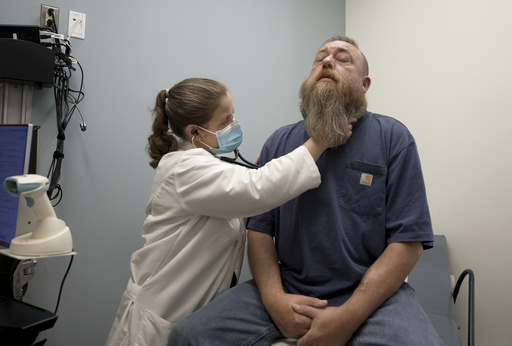
LOUISVILLE, Ky. — Following recent advancements in the use of pig organs for human transplants, medical facilities such as NYU Langone Health and Massachusetts General Hospital have been flooded with inquiries. Many individuals eager for a life-saving organ, concerned about the diminishing availability of human transplants, are curious about when they might be eligible for a pig kidney.
Alex Berrios from Louisville is one such individual in urgent need of a second transplant but struggles to find a compatible donor. He is keenly observing developments in pig kidney research and contemplating participation in the experimental trials. “It may not work, and I have to be OK with that,” Berrios acknowledged, adding, “I think it’s worth the shot.”
In 2025, two U.S. companies plan to initiate the world’s first clinical trials of xenotransplantation, which will involve the use of pig kidneys and hearts in an effort to save human lives. There is a growing impatience among potential participants as researchers finalize the methodologies for testing the humanized pig organs they have been genetically engineered to function more effectively in human recipients.
Encouraging news has emerged from Alabama, where a woman named Towana Looney is showing positive outcomes following her pig kidney transplant at NYU in late November. She became the fifth American to receive a gene-edited pig organ, with her case being one of emergency measures for individuals with no viable options remaining.
Historically, recipients of pig organs faced significant challenges; the previous four individuals who received pig hearts or kidneys did not survive beyond two months. However, researchers remain committed to the pursuit of viable alternatives to address the ongoing shortage of transplantable human organs. “We have to have the courage to continue,” stated Dr. Bartley Griffith, a transplant surgeon at the University of Maryland.
The push for pig organ transplants is heavily influenced by the patients themselves. Reflecting back on 2022, Griffith recalled his initial hesitation to approach a dying patient about the possibility of receiving the world’s first pig heart transplant. Yet, the patient’s lighthearted response and willingness to “learn something for others like me” highlighted the desperate circumstances many patients face.
At a recent gathering organized by the National Kidney Foundation, patients voiced their dire situations regarding dialysis treatments and expressed readiness to consider animal organs. Mike Curtis, CEO of eGenesis, remarked, “Why not try? That was really what we took back. It felt like we almost have an obligation to try.” This sentiment resonated with Dr. Tatsuo Kawai from Mass General, who eventually offered a patient the first gene-edited pig kidney after being influenced by the patients’ desperation.
In Palm Springs, California, Carl McNew has proactively reached out to NYU to inquire about participation in the pig organ research. After donating a kidney to his husband in 2015, McNew’s remaining kidney has also started to fail — a rare occurrence for living donors. Driven by the potential to be part of groundbreaking research, he is eager to explore this cutting-edge possibility.
Berrios faces not only the overarching challenge of donor scarcity but also the complications arising from his highly sensitized immune system, which developed after his initial transplant failed. Tied to a dialysis machine three times a week, Berrios is aware that while dialysis sustains him, it does not provide the same fully functional support that a transplant would.
Future trials will be rigorously conducted to assess the effectiveness of pig organ transplants. The FDA mandates a thorough testing process involving primates before human trials can commence. While researchers have significantly increased the survival rates of these primates, the pressing need for human results remains critical.
To date, patients who have received pig organs have participated in “compassionate use” trials for urgent cases, although the short survival of the first recipients underscored the complexities involved. These preliminary experiments have yielded valuable insights, including better tests to screen for viral infections from pig organs.
Looney’s case is particularly noteworthy, as she represents a potential benchmark for future trial participants due to her relatively better health condition despite years on dialysis. Dr. Montgomery from NYU, who performed her transplant, highlights the significance of her timing in relation to her illness.
Innovations in genetic engineering have empowered scientists to better prepare pig organs for human recipients, but finding the optimal genetic combinations remains an ongoing challenge. Revivicor, a subsidiary of United Therapeutics, is at the forefront of this effort, employing ten gene edits to minimize the rejection risk and optimize compatibility. Meanwhile, eGenesis has adopted an even more extensive approach—utilizing 69 gene edits to tackle various challenges in xenotransplantation.
As research continues, the urgency to demonstrate the longevity and effectiveness of pig organ transplants escalates. The broader medical community is watching closely, with many patients prepared to consider this alternative, particularly as they face dwindling options for human transplantation. Dr. Silke Niederhaus emphasizes the importance of understanding individual patient circumstances when weighing the option between a pig organ and a traditional human transplant.
In summary, the exploration of pig organ transplants represents a crucial frontier in medical science, driven by the pressing needs of patients and the relentless pursuit of solutions to the organ shortage crisis. The coming years will shed light on this innovative approach and its potential to transform lives.

